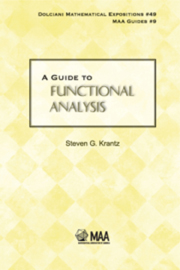1 - Fundamentals
Summary
WHAT IS FUNCTIONAL ANALYSIS?
The mathematical analysts of the nineteenth century (Cauchy, Riemann, Weierstrass, and others) contented themselves with studying one function at a time. As a sterling instance, the Weierstrass nowhere differentiable function is a world-changing example of the real function theory of “one function at a time.” Some of Riemann's examples in Fourier analysis give other instances. This was the world view 150 years ago. To be sure, Cauchy and others considered sequences and series of functions, but the end goal was to consider the single limit function.
A major paradigm shift took place, however, in the early twentieth century. For then people began to consider spaces of functions. By this we mean a linear space, equipped with a norm. The process began slowly. At first people considered very specific spaces, such as the square-integrable real functions on the unit circle. Much later, people branched out to more general classes of spaces. An important feature of the spaces under study was that they must be complete. For we want to pass to limits, and completeness guarantees that this process is reliable.
Thus was born the concepts of Hilbert space and Banach space. People like to joke that, in the early 1940s, Hilbert went to one of his colleagues in Göttingen and asked, “What is a Hilbert space?” Perhaps he did. For it was a new idea at the time, and not well established. Banach spaces took even longer to catch on. But indeed they did. Later came topological vector spaces.
- Type
- Chapter
- Information
- A Guide to Functional Analysis , pp. 1 - 26Publisher: Mathematical Association of AmericaPrint publication year: 2013

